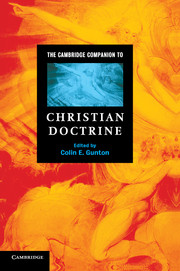Book contents
- Frontmatter
- Part one Christian doctrine in the late twentieth century
- 1 Historical and systematic theology
- 2 On doctrine and ethics
- 3 The basis and authority of doctrine
- 4 The scope of hermeneutics
- 5 Christ and the cultures: The Jewish people and Christian theology
- 6 Christ and the cultures: Christianity and the arts
- Part two The content of Christian doctrine
- 7 The triune God
- 8 The doctrine of creation
- 9 Human being, individual and social
- 10 Redemption and fall
- 11 The church and the sacraments
- 12 Eschatology
- 13 Jesus Christ
- 14 The Holy Spirit
- General index
- Index of biblical references
9 - Human being, individual and social
Published online by Cambridge University Press: 28 May 2006
- Frontmatter
- Part one Christian doctrine in the late twentieth century
- 1 Historical and systematic theology
- 2 On doctrine and ethics
- 3 The basis and authority of doctrine
- 4 The scope of hermeneutics
- 5 Christ and the cultures: The Jewish people and Christian theology
- 6 Christ and the cultures: Christianity and the arts
- Part two The content of Christian doctrine
- 7 The triune God
- 8 The doctrine of creation
- 9 Human being, individual and social
- 10 Redemption and fall
- 11 The church and the sacraments
- 12 Eschatology
- 13 Jesus Christ
- 14 The Holy Spirit
- General index
- Index of biblical references
Summary
'Know thyself.' Socrates' exhortation is as urgent; and problematic; as ever: urgent, because the human race at the dawn of the third millennium; following the demise of the Christian paradigm and the break-up of modernity; is suffering from a collective identity crisis; problematic; because it demands the impossible, since to know oneself truly involves knowing more than oneself. Humans - the self-interpreting animals - have nonetheless responded to the challenge with creativity and zest; striving for self-knowledge through conceptual schemes and cultural works alike.
A THEOLOGICAL STORY?
What is man, that thou are mindful of him?
(Psalm 8:4)To what extent is 'man' the proper study not only of mankind; as Alexander Pope suggested; but of theology as well? Theological anthropology offers a distinctive and decisive perspective on the issue of what it means to be human - a question of no little controversy, and one whose answer has wide-reaching consequences not only for the understanding, but also for the practice, of human being: for debates about genetic engineering, human rights, ecology, sexuality, education and politics. The task of Christian theology is to clarify what is distinctively theological in its account of personhood and to formulate criteria for what is authentically Christian in its accounts of human being.
- Type
- Chapter
- Information
- The Cambridge Companion to Christian Doctrine , pp. 158 - 188Publisher: Cambridge University PressPrint publication year: 1997
- 7
- Cited by

